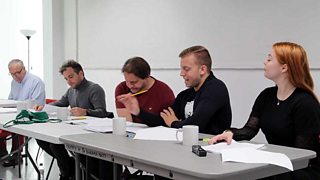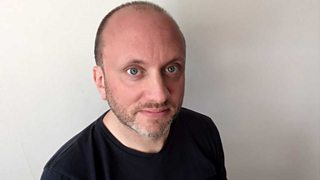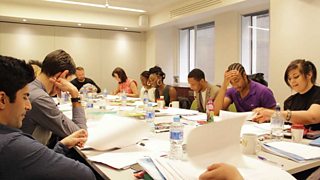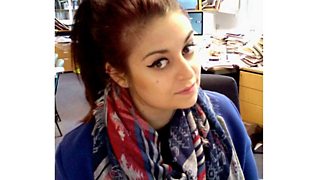The Comedy Studio was a writer-development initiative which ran during the first half of 2015. Richard Webb, Executive Producer for ±«Óãtv Comedy, and two of the writers involved explain what the process involved and what they got from it ...
"Comedy Studio was established by and ±«Óãtv Comedy, with funding from the . We took a group of five writers, from a rich mix of backgrounds, on what we hoped would be a journey towards becoming better writers of comedy. Not just for their sakes, but for the ±«Óãtv’s as well – we’re crying out for new voices, and to bring talented new prospects up to a standard where they can realistically be in with a chance of a commission would be an exciting move for all of us.
We worked with our chosen few over a period of nearly a year, where they were each assigned to a mentor, and went through a series of masterclasses from the likes of and . The programme culminated in a workshop day where the writers were given the chance to hear their work performed by professional actors, undergo (or should that be endure?!) a process of notes from producers, and then rewrite chosen scenes which were again performed in front of the group. At the end of it all, we have five writers who know a lot more about their craft than when they started, and we’re looking forward to keeping an eye on their work as they move forward."
Richard Webb, Executive Producer for ±«Óãtv Comedy

At the read-through for Rob Kinsman's script 'Cousin Harry'
Writing Cousin Harry by Rob Kinsman
I came up with the idea for 'Cousin Harry' while plotting how to murder my carer. Having become disabled three years ago – I’m paralysed from the hips down – I’d realised that my situation gave me something writers are always looking for: insight into a world I could write about in a way that others couldn’t. Obviously there are less dramatic ways to do research than becoming paralysed, but hey, you have to work with what you’ve got. So, one day, while contemplating why my favourite mug had been ‘tidied’ away to a shelf far beyond my reach, it occurred to me that the relationship between a disabled person and their carer was like . Two incompatible characters trapped together because they need each other.
I wrote the pilot episode on spec', detailing how my newly-disabled protagonist, Richard, is discharged from hospital and forced to rely on his well-meaning but incompetent cousin Harry as his carer. The script was sent in to the ±«Óãtv Writersroom's open-submissions , which eventually led to me being told I’d been shortlisted for the Comedy Studio. This sounded exciting, despite the fact I had absolutely no idea what it was. Like most writers, however, I’m easily won over by the prospect of leaving my lair to meet humans and / or eat sandwiches.
I was given a mentor, , author of a very funny book about his own experience of disability. We soon realised that my script suffered from the problems of being a setup episode, i.e. the characters don’t end up in the situation part of the sitcom until quite late on. Working with Nigel and an Exec, I wrote a new episode where the characters were already in situ, focussing on the emotional glue that holds them together, unlike the more practical reasons in my spec' script. A series of master-classes with writers, script-editors and commissioners complemented this work.

Rob Kinsman
What I found most useful (sandwiches aside) was learning how sitcom differs from other forms of screenwriting. Although I’ve been earning a full-time living as a TV writer for around eight years, my produced work has all been on the drama side of the fence. It turns out that sitcom has its own subtly but importantly different rules and conventions that you ignore at your peril. At the heart of this is the truth that sitcom all comes from character. Although my protagonist’s disability informs the situations he finds himself in, it has to be his defective personality, not his physical flaws or a contrived plot, that generates the humour. After all, if you put in a wheelchair he would still make a disaster of things because that’s who he is.
The Comedy Studio climaxed in a reading of the script. Although I was thrilled to have the brilliant Rhys Thomas directing a great cast of actors, the repetitive nature of rehearsal does take all the surprise out of the comedy. Indeed, by the time of the performance I was quietly convinced I’d actually forgotten to put any jokes in the script at all. Fortunately, the audience, who hadn’t spent the previous 48 hours staring at the script until their eyes bled, didn’t know the punch-lines and frequently laughed. A terrific feeling. That said, it was also pretty exposing – jokes that didn’t land felt like they were followed by the kind of endless silences that even would say were going on a bit. But that was all part of the learning process, and without doubt the Comedy Studio has been a great way of breaking down some of the barriers to getting involved with TV comedy, which from the outside can often feel like an impenetrable fortress. And it distracted me from killing my carer, so that’s nice too.

Comedy Studio read-throughs
My Comedy Studio Experience by Emma Corbett
When I entered my rough and ready sitcom episode into the ±«Óãtv Writersroom Comedy Script Room, I wasn't expecting much. I had just finished my masters, which mainly consisted of a lot of late nights frantically tapping away on my laptop in between shots of Jaegermeister and ProPlus, and I just thought, what do you have to lose? I knew of a few people who had sent in scripts to the ±«Óãtv Writersroom Script Room in the past and had got through the first initial stages, so when I received an email informing me that I was one of a few writers that the ±«Óãtv were interested in working with, I was pretty shocked to say the least. Ha ha, me? Really? Oh, really?
I met the previous Head of ±«Óãtv Writersroom, , in a tucked-away little cafe in Camden, and she asked me what I wanted to get out of the ±«Óãtv Writersroom. I resisted the urge to say anything, like literally anything, a free pen maybe? A notepad, (which incidentally I got, actually), instead I replied, “I want to learn the process”. University can teach you so much about technique, and I could waffle on about three act structure or A.B.C plots and character development exercises until the metaphorical cows came home, but what it fails to prepare you for is the ins and out of this wonderful industry…
The Comedy Studio process was an interesting one. After meeting with Richard Webb, and deciding it was the right fit for me, the next few months mainly consisted of writers coming in to talk to us about their experiences and offer advice where they could. Some were more useful than others but what was fantastic was that it felt like I was being spoken to as a writer, not a writing student, especially when it came to Andrew Ellard, who I honestly cannot speak highly enough of. He has this great ability, which most likely comes from his experience as a script editor, to completely, objectively, cut through the crap. Andrew will tell you if something works or doesn't, whether that’s the whole concept of your piece, or just the punchline to a joke.
Watch Andrew Ellard with some great advice for Comedy writers.
Then it was time for the scary part, the actual writing. I was assigned a Development Producer and mentor. I feel it’s important to mention that I was the ONLY female finalist. I’m not bragging at all, in fact quite the opposite. Donʼt get me wrong, the rest of the guys were great, talented and funny but hearing someone pitch their show as the male version of ʻʼ did sting a bit. Thereʼs me thinking, isn't everything that already? Anyways, I felt it was important to my writing to have a female as my mentor, and I really lucked out with mine. is a fantastically funny and charming lady, who was on hand to offer priceless advice. My Development Producer, , (from ±«Óãtv Writersroom) has also always been around to tell me what works and what doesn't and just generally be lovely and thoughtful.
So together, we worked towards redrafting my script for the actor read-throughs. This was a new experience for me, not always easy, but a process that I definitely wouldn't have learnt without being part of Comedy Studio. After the rewrites came the script read-throughs. To be honest, the actors hadn't had the scripts for long so things felt a bit rough and ready. I was deaf to the laughter, and I was PAINFULLY aware of when someone wasn't laughing. If a joke didn't land, I was obsessed with knowing why not. If the whole room wasn't in fits of laughter, I wasn't satisfied. That’s comedy for you. That’s comedy writers for you!

Emma Corbett
After the read-throughs, came the feedback sessions, which were so useful, especially when all the criticism levelled up. Andrew Ellard and Jo set us what seemed like the impossible task of rewriting a scene that didn't quite work within 30 minutes. Talk about pressure. Talk about the best thing to come out of the whole process! I re-wrote a scene that hadn't quite worked following the advice from the room and wow, something just clicked.
That’s the stage Iʼm at now - the big scary rewrite of each scene from this fresh perspective. Iʼm not overwhelmed at all … Iʼm just going to take a quick check of Facebook and then crack on … and maybe Instagram, and Twitter ...
±«Óãtv Writersroom will shortly be announcing details of a new development scheme for successful writers in our open submission Script Rooms and other talent searches.
